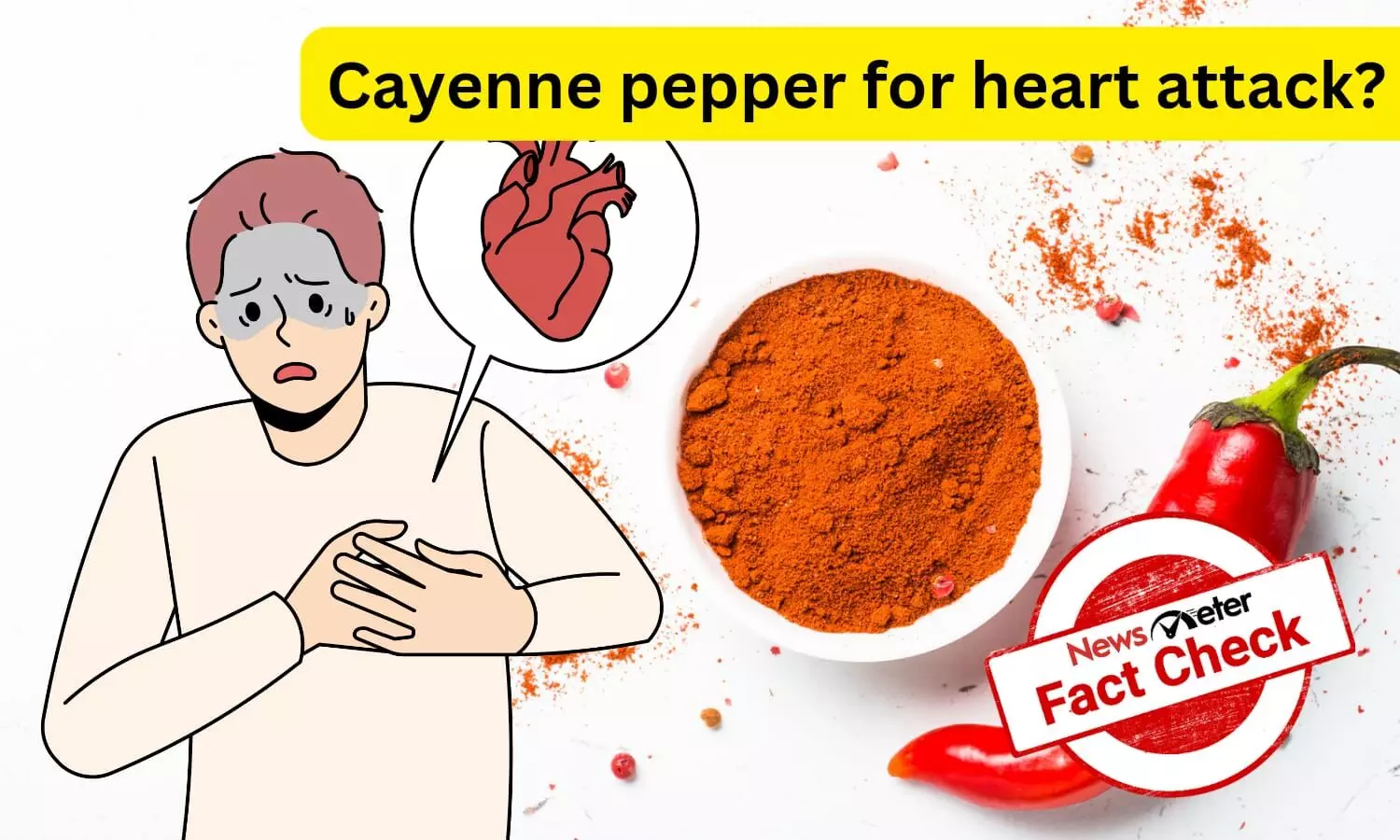Fact Check: Can Cayenne pepper prevent or stop heart attacks?
No scientific evidence says that cayenne pepper can prevent, treat or stop a heart attack
By Sunanda Naik
Hyderabad: A video of Barbara O’Neill posted on Facebook, an unregistered and permanently banned naturopath from providing health services by the Australian medical authorities, has gone viral for claiming that Cayenne pepper has the potential to treat or stop a heart attack.
The full video can be seen on YouTube here. A similar post can be seen here.
In the video, narrating a personal situation, she claims that she allegedly saved a woman from a heart attack, in the middle of a cooking class using Cayenne pepper.
Fact Check
NewsMeter found that the claim is false.
What is Cayenne pepper?
According to Medical News Today, “Cayenne pepper is a hot chilli in the Capsicum family. Cayenne pepper benefits may include relieving pain, reducing inflammation, treating colds, and more.”
Cayenne pepper is said to have a range of health benefits as well such as relieving pain, managing weight, easing itching, reducing inflammation, treating colds and congestion and protecting the nervous system.
However, scientific evidence has yet to prove many of its health benefits. The MNT article further adds, “The evidence for this has come from studies that tested the compound in creams and supplements — adding cayenne pepper to the diet may not have the same positive effects.”
Can Cayenne pepper stop a heart attack?
No, it can’t. The false premise has taken shape from a famous Italian research that has been highly misinterpreted. The study found that people who ate chilli at least four times a week were 44 per cent less likely to die from coronary heart disease and 61 per cent less likely to die of a stroke, compared with those who ate chilli rarely or never.
As per the British Heart Foundation, “The study looked at a large number of men and women – almost 23,000 — all from a specific area of southern Italy. Although a large number of people studied there, there were a much smaller number of deaths in the time period – 1,236. Of those deaths, 162 were due to coronary heart disease and 96 were due to stroke. So, the findings are based on relatively small numbers of deaths.”
“It’s also important to remember that this kind of study is observational, which means it can’t prove that eating chili caused the results, it can only show an association,” it adds.
The study was also covered by a few media organizations as well such as The Sun and The Telegraph, which exaggerated the results of the study.
Regarding debunking the urban myth about drinking a glass of water with a spoonful of Cayenne pepper to save oneself during a heart attack, First Aid For Life says, “Supporters suggest Cayenne pepper is a stimulant capable of increasing the heart rate and carrying blood all over the body, rebalancing circulation. There is no proof, however, that cayenne pepper is useful when taken at the start of a heart attack. Furthermore, it isn’t clear how capsaicin interacts with aspirin when taken during a heart attack.”
In a PubMed article titled ‘Should Critical Care Professionals Take Hoaxes/Rumours Seriously?’ the claim about Cayenne pepper along with warm water helping a person suffering from a heart attack has been called a clear hoax. There is indeed an association but no causal relation between heart attack and Cayenne pepper, the study concludes.
What to do instead?
- Improve your lifestyle and quit smoking
- Work on your diet to control high blood cholesterol and high blood pressure
- Work on your weight
- Stay physically active
- If diabetic, plan treatment and manage blood sugar
- Limit drug abuse
- Consume a healthy and balanced diet
- Lastly, seek immediate health care in case of a heart attack and stay away from hoax remedies.